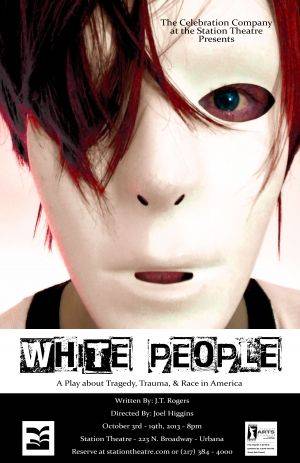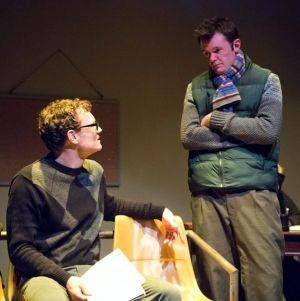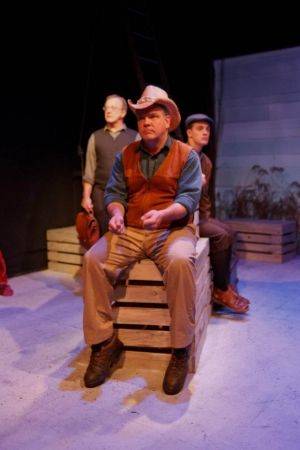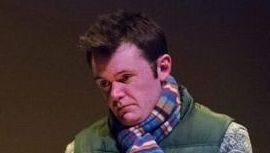White people are everywhere. They’re in our schools, our restaurants, our government offices, our shops and stores. They are unavoidable, and their impact on our lives is inescapable. Damn white people!
Imagine this article starting with a similarly blunt listing of any minority group overrunning our public spaces and our mass culture and you have a fair preview of what an evening viewing J.T. Rogers’ play White People will be like. It will discuss the thoughts not verbalized in polite society. It will bluntly depict white culture blaming many social ills on various minorities. It will kick at and overturn the slimy rocks that conceal our nation’s racism. It will make you squirm…and think. Of course, thinking is hard, and looking under slimy rocks is messy and unnerving. So why do I highly recommend you attend this insightful and disturbing meditation on race in America?
 The play—which will be mounted as the first offering of the 42nd Season of the Celebration Company at The Station Theatre in Urbana—introduces a season that intends to challenge our beliefs about ourselves and our collective legacy to the world. It will attempt to kickstart an important discussion of race that needs to be had but is rarely even mentioned in popular media or the classroom. With three seemingly average white Americans telling their tales of how racial diversity affects their lives, we, the audience, are drawn in by benign and familiar folks just like us (See what I did there? Like “us?”) from across the country as they weave tales of their survival and accidentally trip-wire the racial powder keg that lies beneath our polite demeanors and meaningless pleasantries. Regardless of your views of our current president, we must acknowledge the fact that America has undergone a significant change with the election of a person of color to the highest office of the land, and a lot of people resent the hell out of it, and their rhetoric against said president is at least tinged with racist fears of how “the other” is changing their world. White People is an example of how a significant theatrical event can change our personal perceptions of “our” world.
The play—which will be mounted as the first offering of the 42nd Season of the Celebration Company at The Station Theatre in Urbana—introduces a season that intends to challenge our beliefs about ourselves and our collective legacy to the world. It will attempt to kickstart an important discussion of race that needs to be had but is rarely even mentioned in popular media or the classroom. With three seemingly average white Americans telling their tales of how racial diversity affects their lives, we, the audience, are drawn in by benign and familiar folks just like us (See what I did there? Like “us?”) from across the country as they weave tales of their survival and accidentally trip-wire the racial powder keg that lies beneath our polite demeanors and meaningless pleasantries. Regardless of your views of our current president, we must acknowledge the fact that America has undergone a significant change with the election of a person of color to the highest office of the land, and a lot of people resent the hell out of it, and their rhetoric against said president is at least tinged with racist fears of how “the other” is changing their world. White People is an example of how a significant theatrical event can change our personal perceptions of “our” world.
Full disclosure: I have had the pleasure of producing this production for the Celebration Company with the assistance of Thom Miller, and have also had the pleasure of watching this production take shape. I have seen the show cast, designed, blocked, and rehearsed, and all involved have dedicated themselves to producing a quality piece for the Celebration Company. In addition to taking reservations and picking up program and poster regalia, I recently let my fingers do the talking and e-interviewed the production’s director, Joel Higgins, and the play’s cast—Shawna Smith, David Kierski, and Michael Murphy—about what they think of this provocative piece and why they wanted to be involved.
 Let’s begin with Joel Higgins (pictured at right, standing, with David Kierski), who is directing his first production for the company. With impressive acting and theatrical credits elsewhere, Joel first came to local attention as the protagonist of last season’s production of Stephen Karam’s play Sons of Prophet. He is a dedicated artist and kind of a buddy, so here goes…
Let’s begin with Joel Higgins (pictured at right, standing, with David Kierski), who is directing his first production for the company. With impressive acting and theatrical credits elsewhere, Joel first came to local attention as the protagonist of last season’s production of Stephen Karam’s play Sons of Prophet. He is a dedicated artist and kind of a buddy, so here goes…
Smile Politely: Hi Joel. This is your directorial debut in Champaign-Urbana, so I’m inclined to ask what attracts you to a project as a director, and what made you choose White People for your debut vehicle?
Joel Higgins: What attracted me to White People is that it’s one of those rare plays that takes certain stances on issues without sacrificing its humanity to do it. White People is moving, but not just because it’s racially sensational; nor does it seek controversy for controversy’s sake. The playwright constructed three very real, very human, very honest characters who just happen to all be struggling with similar issues. I find it to be completely intoxicating.
SP: What is J.T. Rogers attempting to convey about race in America, and what will your production emphasize in this piece?
Higgins: I think Rogers is making a point, not necessarily about race in America on a macro level, but about something that’s a lot harder to discuss. I mean, it’s easy to look at someone who feels certain prejudices and call that person a racist. It’s easy because we all think those people deserve it. What’s harder, I think, and what I believe Rogers is doing in White People, is dissecting discrimination as a normal response to perceived threats, traumas, and losses of control. To bring that out in our production, we focused as little as possible on race during the rehearsal process. On the bulletin board in the theatre’s lobby, there were some articles pinned up for the cast to look at if they felt like it, and we talked about race as it related to character in rehearsals, but that’s pretty much it. I think the only way to pull off Rogers’ point is to ignore it. Once I compartmentalized the issues the play raises, then I moved onto getting three very honest performances out of our three ridiculously talented cast members. At that point, I began to realize just how little I understood race and how terrified I was at being forced to stare at my own privilege for an hour and a half every night. I hope at least a few people walk away from this play with the same reaction. It was honestly revelatory.
 SP: What are the challenges of staging this piece? How do you, and your cast and crew, address this challenges?
SP: What are the challenges of staging this piece? How do you, and your cast and crew, address this challenges?
Higgins: Well, first off, there’s no blocking throughout the script. I suppose for some people that would be pretty terrifying, but in this production we’ve made it work largely because I’m an actor’s director (or like to believe I am), and as such I just gave the cast free reign to feel their spaces out. I followed them and then peppered in some tidbits here and there.
SP: Since this is the first piece of the Celebration Company’s 42nd Season, how does White People set the tone for the remainder of this season?
Higgins: This is a heavy season, but it’s not without its lighter moments. I think The Celebration Company not only finds a way to consistently maintain its relevance in an internet world, but to expand it. That’s admirable for any theatre these days. White People sets the season up to be thought-provoking and challenging, and to give the C-U area something it can’t get anywhere else: local people doing fantastic work just for the hell of it.
********
The cast of White People has the daunting task of bringing humanity to characters, who are at times, quite unsympathetic. They also have to embrace the head-space of a character whose thoughts and actions they find morally or politically objectionable. This is not Fiddler on the Roof. Higgins has assembled an eclectic group of actors with deep roots in The Station Theatre. Shawna Smith is a recently retired board member of the company and has done props, production, and assistant directing for many productions, including mine. Her last acting challenge was in the company’s production of Eugene Ionesco’s Rhinoceros. David Kierski is a recent arrival to the company, appearing most recently as the sexually ambitious reporter in Sons of Prophet. Michael Murphy is the proprietor of Mike n’ Molly’s and has also worked with the company on various productions, including My Antonia, and last season’s Hamlet. Higgins’ direction is focused on respecting the actor and the actor’s process, so it seemed fitting to discuss the effect of embodying these characters on their portrayers.
********
SP: Hi gang! Let’s first discuss why you each wanted to be a part of this production.
Michael Murphy: I love doing theatre, but as a man of a certain age, roles can be few and the number of people to fill them… more than few. Martin is an angry man, and as someone who has more experience with comedy, and whose job is hospitality, it is a welcome opportunity to have a role that allows me to vent some inner frustrations and hostilities. My character gets to exorcize his demons, and I get to exercise mine. Plus, this is a nice chewy part, and I am grateful for the opportunity to stretch myself in this way.
 David Kierski: When I found out about the show, and that there was a part in my age range, I got excited about it right away. My wife and I talk a lot about racism, the difference (if there is one) between stereotyping and racism—those kinds of things. I know that I don’t understand and will never be able to fully understand all the ramifications of me being a white man in today’s American society—all the privilege I enjoy just because of being born a certain gender and race—but I love to take any opportunity to examine it and explore it. And to be able to go through that exploration with a bunch of people and hopefully take them through that exploration process… I feel like that’s something very worthwhile.
David Kierski: When I found out about the show, and that there was a part in my age range, I got excited about it right away. My wife and I talk a lot about racism, the difference (if there is one) between stereotyping and racism—those kinds of things. I know that I don’t understand and will never be able to fully understand all the ramifications of me being a white man in today’s American society—all the privilege I enjoy just because of being born a certain gender and race—but I love to take any opportunity to examine it and explore it. And to be able to go through that exploration with a bunch of people and hopefully take them through that exploration process… I feel like that’s something very worthwhile.
Shawna Smith: I had a few conversations with Joel about the show, and after reading the script, the role of Mara Lynn appealed to me on a personal level, mainly due to the relationship between her and her son.
SP: What is unique about your character, and how does this character differ from you personally
Kierski: Alan has had a horrible thing happen to him that causes him to question a lot of the beliefs that he had, both about himself and about other people. He was quite proud of these beliefs, so to find out that this image you had of yourself might not really be who you really are is a disturbing thing to confront. I personally have never had anything happen to me as terrible as Alan (knock on wood), and I’m grateful to not have to deal with that level of trauma in my life.
I’d also like to think that I am not as smug as Alan was pre-incident, but that might show how un-self-aware I am. Alan’s terrible thing that happened to him may very well be a blessing in disguise, because it forces him to search his soul and admit things at a depth where I don’t know if I’m able to go.

Murphy: Martin lives life “according to plan.” He is a man transplanted from his native environs to a new setting, for his kids’ sake. His wife leaves him, and so he clings tightly to his “rules.” He and I are eerily similar in that way, the rules part, not the transplant and not the wife and kids part. He is intrinsically a narcissist, and more subtly a bigot, but he doesn’t see it. He believes that merely wishing no harmmakes him not a bigot. I am not perfectly colorblind either, but I’d like to think I am more self-aware and not separatist like Martin. We both try to believe we base our judgments on action not color, but Martin deludes himself into believing that color and culture are completely separate and that that is a problem for them to overcome. They need to come to his way of thinking, and he uses “Law” to rationalize that he is perfectly objective, not considering that the law itself is culturally subjective. Martin believes he put himself where he is and that his race had nothing to do with his success. I like to think I know better, but as Martin likes to point out, this is not a topic easily or openly discussed.
Martin loves his children like I love my nieces and nephews, and he tries to set a good example, as do I, mostly. But, Martin thinks his is the only and impeccable example his children and/or his associates should follow. He makes the mistake I think many people make, that “If I define reality the way I wish it to be, then it will respond the way I wish it would.” That’s not so much racist as it is just narcissistic and foolish.
In the end I personally think Martin is more narcissistic than racist, but both ways of being are ignorant… so it’s not like that makes him any better.
Smith: What’s unique? I honestly have no idea. What’s surprising though is that I found her likeable. I was prepared not to like her at all due to a variety of stereotypes and the subject matter of the show. As I continue to explore Mara Lynn, though, there’s more to her than just a bigoted former beauty queen. She has honesty, strength and heart. What differs? I’m not a bigot.
SP: This is a pretty dark piece. How do you get into the character’s head before every performance and how easy or difficult is it to leave the character when each curtain falls?
 Smith: How I get there every night, some nights with greater success than others, is a rather personal journey. I think a lot about the relationship between mother and child to get where I am for each performance. It’s difficult for me to leave the character behind. I have a very specific child (i.e. personal family member) that I think of to get me where I need to be emotionally. It’s not something that I walk away from at the end of the night; it follows me home and sometimes it lingers for hours after a rehearsal.
Smith: How I get there every night, some nights with greater success than others, is a rather personal journey. I think a lot about the relationship between mother and child to get where I am for each performance. It’s difficult for me to leave the character behind. I have a very specific child (i.e. personal family member) that I think of to get me where I need to be emotionally. It’s not something that I walk away from at the end of the night; it follows me home and sometimes it lingers for hours after a rehearsal.
Murphy: Martin and I both run a business. On that level we understand each other all too well. When you run a business, you feel the weight of responsibility, and you have anger, trust me. Martin is an angry man. At my age, I have had plenty of life experiences that have pissed me off and some that still piss me off. I have watched cancer slowly devour several family members, lost faith in people close to me and my family, and tasted betrayal, more than once on each count, to put it mildly. All of these dark memories feed and inform my performance, I hope convincingly. Getting into a dark character is scary because you become vulnerable to exposing your own dark corners without fully realizing what you are giving away about yourself, and the lines between Who I Am and Who Martin Is can get blurry. I suppose I just ruminate on life’s disappointments to get into character. As far as leaving a character, well, there are nights when you are on and nights when you aren’t and I think the key to leaving the character is to leave it all on stage. And by that I mean, that the better you hit the “notes” you want to hit and feel satisfied that you hit them, it is easier to let go of it when you exit the stage.
Kierski: I’ve been finding it pretty difficult to get into “Alan-mode” because he’s both so similar to and so different from me. It was hard for me to try to put myself in his shoes and try to feel how I would react in his situation, so Joel suggested that I take a step back and try to see Alan as if I was watching a movie of him, to see him as someone completely different than myself. That helped a lot: I could watch him react without feeling like it was me doing the reacting. Being in costume also helps because (I hope) I would never dress like Alan! As far as leaving Alan after the curtain falls… alcohol certainly helps.
********
White People, a play by J.T. Rogers, will open at the Station Theatre in Urbana on October 3 and run through October 19. All performances begin at 8 p.m., and reservations can be made by calling 217-384-4000 or by visiting the Station’s website.








